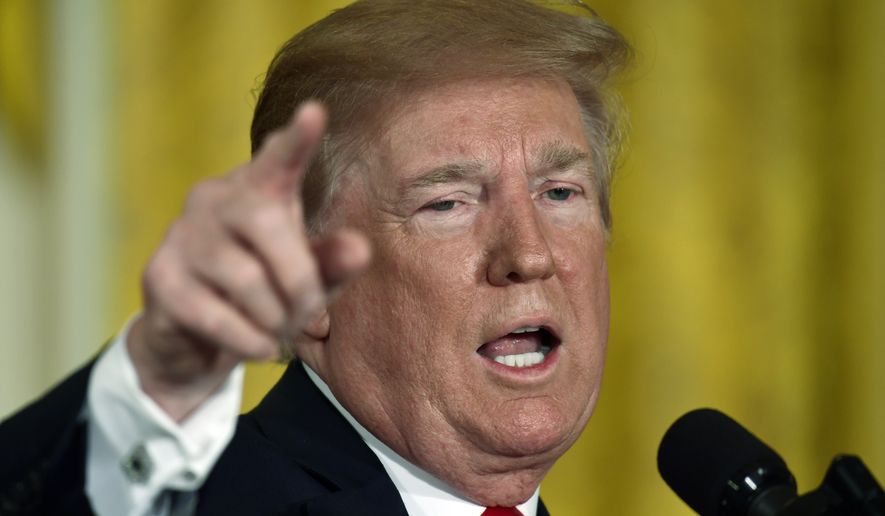President Trump escalated his trade feud with China on Monday night, threatening to impose tariffs of 10 percent on another $200 billion worth of Chinese goods in retaliation for previous tariffs and Beijing’s intellectual-property practices.
“After the legal process is complete, these tariffs will go into effect if China refuses to change its practices,” the president said in a statement.
Last week, Mr. Trump announced plans for tariffs on $50 billion worth of imports from China in the technology sector, a move aimed at what he called “bringing balance to our trade relationship with China.”
China retaliated with $50 billion worth of U.S. exports, including agricultural products.
“China apparently has no intention of changing its unfair practices related to the acquisition of American intellectual property and technology,” Mr. Trump said. “Rather than altering those practices, it is now threatening United States companies, workers, and farmers who have done nothing wrong.”
He said the action by Beijing “clearly indicates its determination to keep the United States at a permanent and unfair disadvantage, which is reflected in our massive $376 billion trade imbalance in goods.”
“This is unacceptable,” Mr. Trump said.
He ordered U.S. Trade Representative Robert E. Lighthizer to identify $200 billion worth of Chinese goods for additional tariffs at a rate of 10 percent, which will be imposed if Beijing “insists on going forward with the new tariffs that it has recently announced.
“The trade relationship between the United States and China must be much more equitable,” Mr. Trump said. “We will continue using all available tools to create a better and fairer trading system for all Americans.”
The tariffs announced by the White House on Friday hit more than 1,100 Chinese products with 25 percent levies. In April, the administration originally proposed the tariffs on 1,333 Chinese products, but modified the targeted items after public feedback.
Starting July 6, the U.S. tariffs will go into effect for 818 Chinese products worth $34 billion a year in imports; the remaining tariffs won’t go into effect until the administration collects more public feedback.
Beijing said its penalties of 25 percent will hit 659 U.S. exports, including apples, pork, autos and seafood. Although aircraft initially was on the list, China removed it from the tariffs. But Beijing also canceled an agreement Mr. Trump had wrested from Chinese President Xi Jinping to buy more U.S. products and reduce his country’s trade surplus.
“The Chinese side doesn’t want to fight a trade war, but facing the shortsightedness of the U.S. side, China has to fight back strongly,” the Chinese Commerce Ministry said in a statement. “We will immediately introduce the same scale and equal taxation measures, and all economic and trade achievements reached by the two sides will be invalidated.”
U.S. soybean farmers, who export nearly two-thirds of their product to China, are concerned about the impact of the trade feud.
Beijing and Washington have held three rounds of high-level trade talks since early May but failed to reach an agreement.
Mr. Trump also is engaged in trade fights with Canada, Mexico and the European Union over tariffs on steel, aluminum, autos and other products.
• Dave Boyer can be reached at dboyer@washingtontimes.com.




Please read our comment policy before commenting.